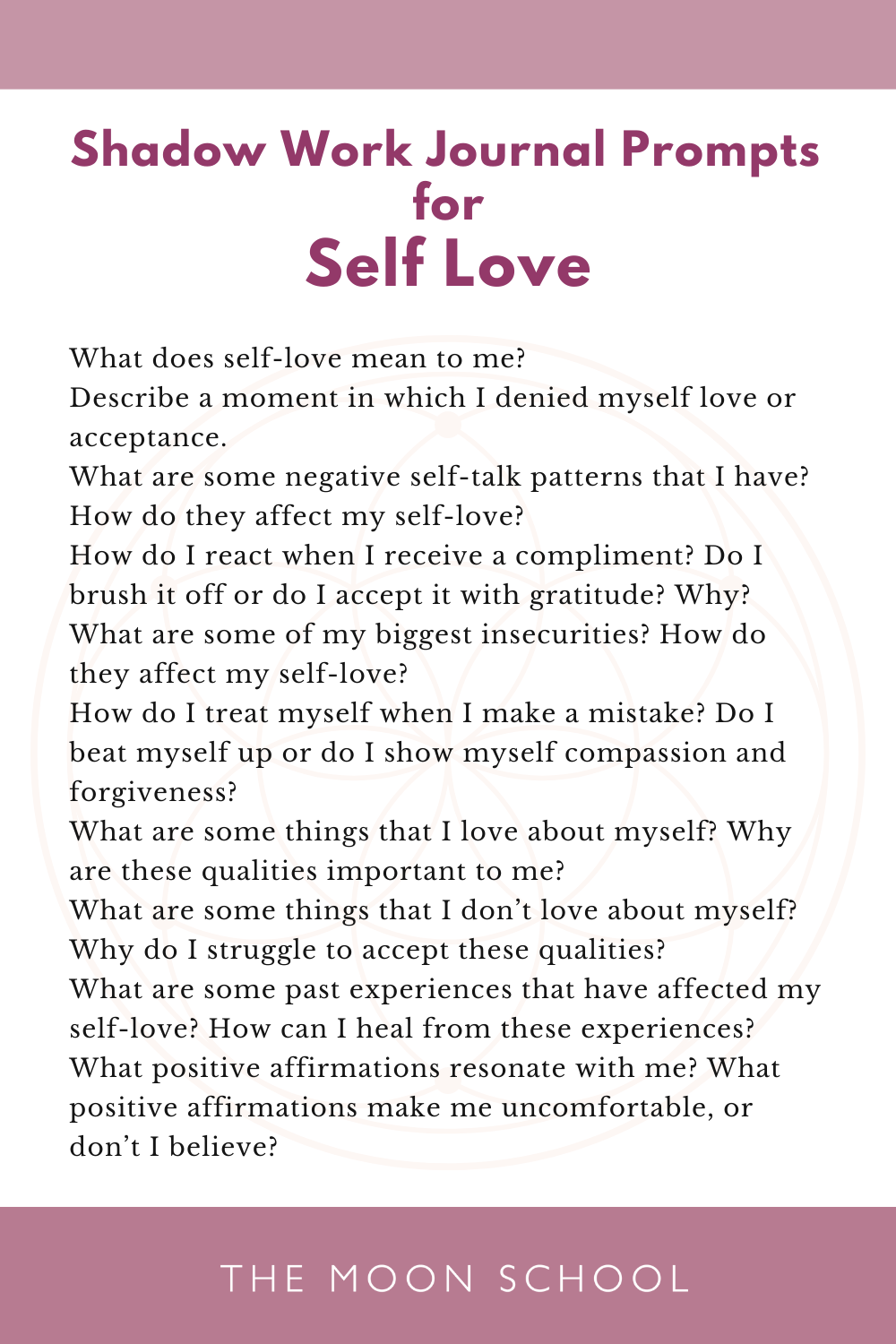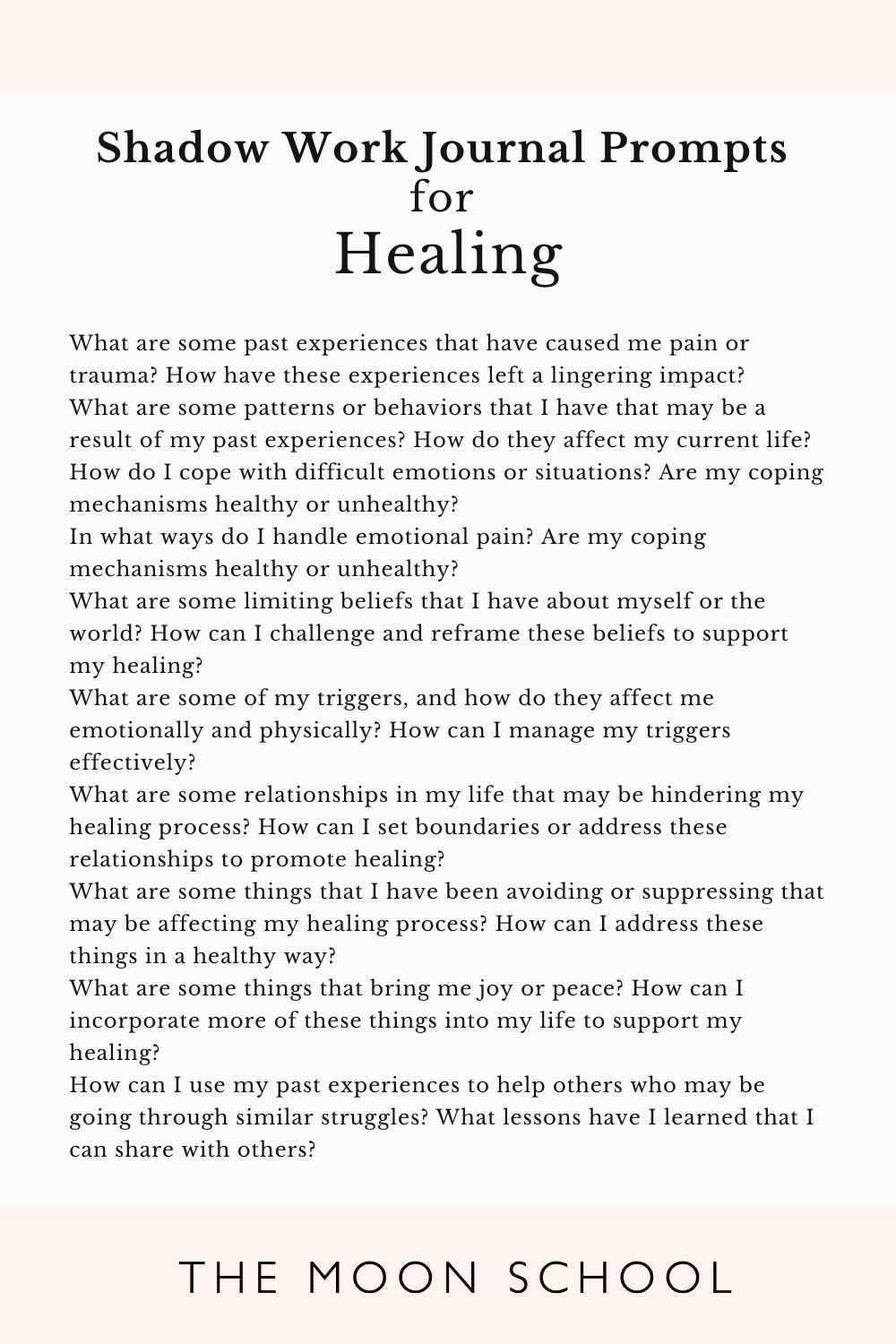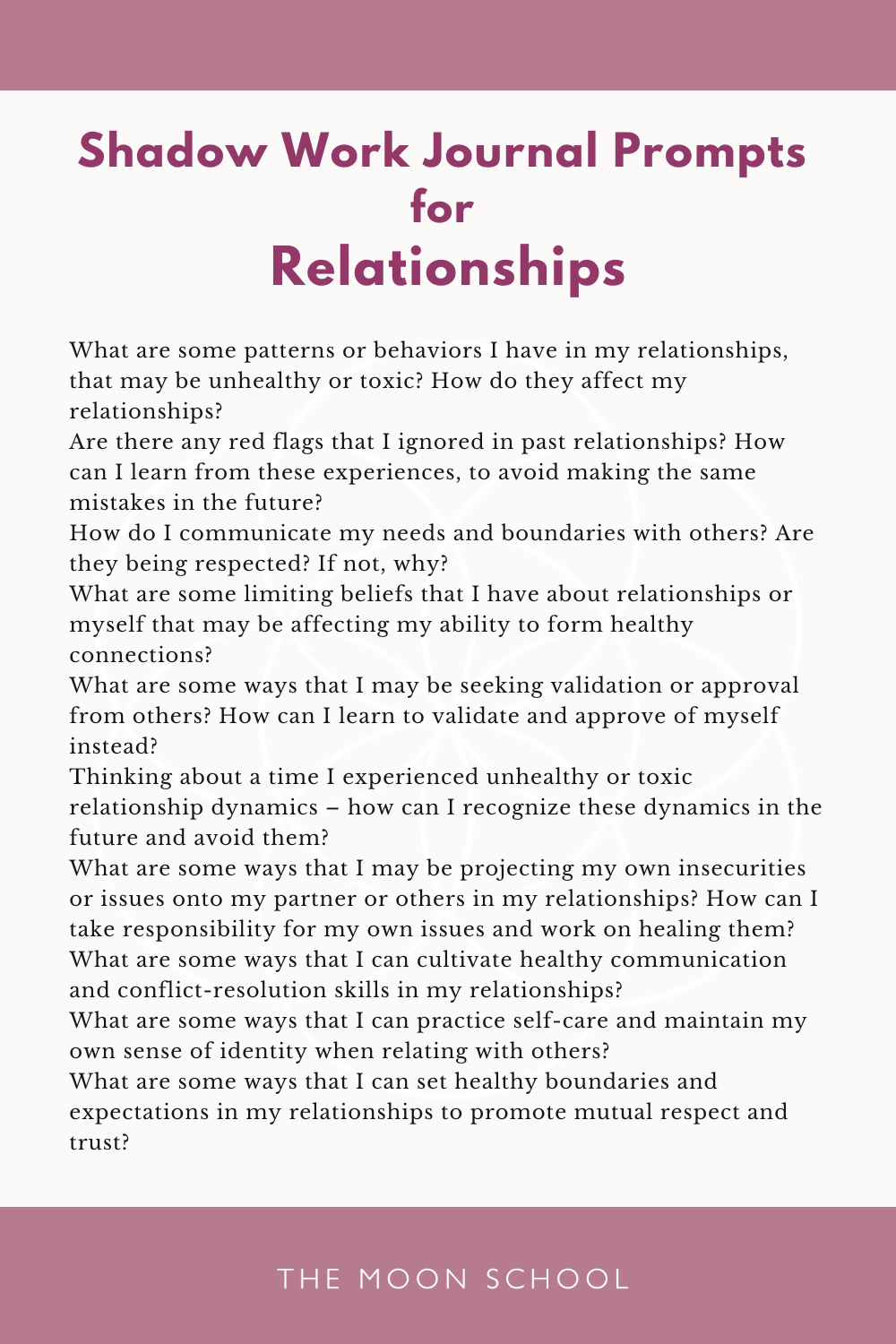Shadow work prompts provide a valuable opportunity for personal growth and healing by helping you explore the hidden aspects of your thoughts, beliefs, and emotions. As you embark on this journey into the dark side of your psyche, it’s important to remember that self-discovery can be both challenging and rewarding.
So be prepared to face some difficult emotions! For true transformation, this is a necessary part of the process.
Journaling is one of the most effective ways to engage in shadow work. Using prompts can be an excellent starting point for self-reflection. The shadow work journal prompts in this article are designed to help you confront your inner shadows with a sense of curiosity and compassion. This will give you the opportunity to acknowledge, understand, and ultimately integrate these hidden aspects of yourself.
The result of working with them will (hopefully!) be a more complete understanding of who you are, coupled with a stronger sense of emotional balance in your life.
As you explore various shadow work prompts, remember that the journey is unique to each human being. Some prompts may resonate deeply with you, while others may not. Trust your intuition and take the time to engage with the prompts that feel most relevant and challenging to you. Doing this will mean you make the most of this powerful tool for personal growth and self-discovery.
But before we get to the prompts, what IS the shadow and what is shadow work?!
What is the Shadow?
In psychology, the shadow refers to the unconscious aspects of somebody’s personality. It contains thoughts, feelings, and behaviors that are considered socially unacceptable or unacceptable to the individual themselves. For this reason, they’re often repressed or denied.
The shadow tends to be considered to be the darker side of an individual’s personality. Because it can’t be expressed consciously, it manifests in various ways, such as through dreams, judgments, projection onto other human beings, trauma activations, or outbursts or reactions to moments of extreme stress or anxiety.
The Swiss depth psychologist Carl Jung was one of the first people to explore the concept of the shadow in depth. He believed that integrating one’s shadow was crucial for achieving psychological wholeness and fulfilment.
What is Shadow Work?
Shadow work is a process that involves exploring the hidden, repressed, or darker parts of your psyche. One way to understand the concept of the shadow self is through the lens of the archetypal shadow. This is the idea that all humans possess a darker side that they prefer not to face. This darker side may contain unresolved emotions, deep-seated fears, or even past traumas.
Want to dive deeper?
Check out: What is Shadow Work? (Plus easy shadow integration for beginners)
Identifying your Shadow Aspects
When beginning your shadow work journey, you need to first identify your shadow aspects. These are the specific emotions, beliefs, and patterns that you have been repressing or hiding from your conscious awareness. But remember, these aspects exist in the unconscious mind. So it’s not always easy or straightforward to find them.
Some common shadow aspects might involve repressed feelings of shame, guilt, or anger. Or personality traits like assertiveness, or neediness To better understand and identify these aspects, ask yourself the following questions:
- What are some situations that trigger strong emotional reactions in you?
- Are there certain emotions you find difficult to express or acknowledge?
- What patterns of behavior do you notice repeating in your life, particularly ones that may be causing instability or dissatisfaction?
For more ways to identify your shadow traits and aspects, read this: 6 Ways to Meet Your Shadow Twin
Working With Your Shadow Self
Once you’ve identified some aspects of your shadow, it’s time to start working with them. Notice I wrote ‘with’ them. When you begin working with your repressed shadow self, it’s important to see the parts of yourself it contains in a kind and compassionate way. You’re working in partnership with your shadow, not trying to bulldoze it into submission.
Shadow work can involve many different processes and practices. But ultimately, it involves delving into your unconscious mind, to explore those darker parts of your personality.
Shadow work prompts offer a really valuable tool to guide you through this process.
The great thing about using writing prompts is that it can be self-led and you can go at your own pace. When you start to unlock your subconscious mind through writing, that inner voice can be hard to hear. If you take the time to dive deep, you will find that this work leads to a more balanced and integrated sense of self.
Embrace the journey and remember that even the darkest aspects of your psyche can teach you valuable lessons. In fact, they may even teach you the most valuable lessons of all. Learning these will allow you to move forward with a much deeper and kinder understanding of yourself.
Shadow work prompts for personal growth
From the most probing and deep shadow work prompts to more surface-level exploration, the main purpose of using writing as an access point to your unconscious, is for personal growth.
Although this journey looks very different for everybody, shadow work specifically involves looking at so-called “negative traits”. We’ll have a look at how these may show up, in different arenas of the personal development world, and list some corresponding and appropriate shadow work journal prompts for each.
Shadow work prompts for self love
Fostering self-love is vital when embarking on any journey of self-discovery. But it’s complex – most people have felt rejected in their lives, been wounded by their main caregivers (even unintentionally), and may struggle with low self-esteem or issues with their own body or image.
So if self-love proves a challenge for you (and there’s no shame in that!), you may need prompts designed specifically to help you unravel your deeper emotions around self. Here’s a list of prompts for you to engage with –
- What does self-love mean to me?
- Describe a moment in which I denied myself love or acceptance.
- What are some negative self-talk patterns that I have? How do they affect my self-love?
- How do I react when I receive a compliment? Do I brush it off or do I accept it with gratitude? Why?
- What are some of my biggest insecurities? How do they affect my self-love?
- How do I treat myself when I make a mistake? Do I beat myself up or do I show myself compassion and forgiveness?
- What are some things that I love about myself? Why are these qualities important to me?
- What are some things that I don’t love about myself? Why do I struggle to accept these qualities?
- What are some past experiences that have affected my self-love? How can I heal from these experiences?
- What positive affirmations resonate with me? What positive affirmations make me uncomfortable, or don’t I believe?
Take some time to write about these topics in your journal, encouraging an honest dialogue with yourself as you delve into your feelings.
Shadow work prompts for healing
Healing is a crucial element of any personal journey, and using shadow work prompts can uncover emotional wounds that need attention. Here’s a list of prompts to spark self-reflection, create doorways into the experiences of your past self, and nurture healing:
- What are some past experiences that have caused me pain or trauma? How have these experiences left a lingering impact?
- What are some patterns or behaviors that I have that may be a result of my past experiences? How do they affect my current life?
- How do I cope with difficult emotions or situations? Are my coping mechanisms healthy or unhealthy?
- In what ways do I handle emotional pain? Are my coping mechanisms healthy or unhealthy?
- What are some limiting beliefs that I have about myself or the world? How can I challenge and reframe these beliefs to support my healing?
- What are some of my triggers, and how do they affect me emotionally and physically? How can I manage my triggers effectively?
- What are some relationships in my life that may be hindering my healing process? How can I set boundaries or address these relationships to promote healing?
- What are some things that I have been avoiding or suppressing that may be affecting my healing process? How can I address these things in a healthy way?
- What are some things that bring me joy or peace? How can I incorporate more of these things into my life to support my healing?
- How can I use my past experiences to help others who may be going through similar struggles? What lessons have I learned that I can share with others?
Reflect on these prompts in a journal, writing freely. If this is too difficult, try working with them through meditation. Pay close attention to your emotions, and hold yourself with more compassion throughout the process.
Shadow work prompts for exploring the inner child
Shadow work can be a powerful tool for healing inner child wounds.
The inner child is an aspect of self that has remained childlike, even as a person grows into adulthood. This happens when our needs aren’t met in childhood, and parts of the child self aren’t able to grow and develop, meaning developmental stages aren’t integrated properly.
Shadow work prompts can be used to bring awareness to any patterns and behaviors caused by these unmet needs. By acknowledging and validating these emotions and needs as an adult, individuals can begin to heal and integrate their inner child. This is incredibly empowering work! Looking specifically at these shadow traits can release you from the grip of some shadow traits that are a hangover from your younger self.
- What are some of my earliest memories from childhood? How do these memories make me feel now?
- What were some of my favorite activities or hobbies as a child? How do these activities still bring me joy today?
- What were some of my biggest fears or insecurities as a child? How do these fears and insecurities still affect me, and how do they no longer serve me?
- What were some of the messages that I received from my caregivers or authority figures during childhood? How do these messages still affect me today?
- What were some of the unmet needs that I had as a child? What can I do to meet those needs as an adult?
- Thinking about a time I had to cope with difficult emotions as a child – are these coping mechanisms still healthy or do they need to be reevaluated?
- What were some of the ways that I sought validation or approval from others as a child? How do these patterns still affect my relationships today?
- What were some of the ways that I expressed my creativity or imagination as a child? How can I incorporate more of these activities into my adult life?
- What were some of the ways that I experienced joy or playfulness as a child? How can I cultivate more joy and playfulness in my adult life?
- What are some ways that I can connect with my inner child and offer them the love and support that they missed out on during childhood?
Inner child work resonating?
Explore yours in more depth: Inner Child Work: Heal Your Past and Empower Your Future!
Shadow work prompts for relationships
Shadow work can be a powerful tool for healing and deepening your relationships. Through exploring your own shadow, you can come to understand your relationship patterns better. This affects how you relate with friends, intimate partners, and family members. Here are several shadow work prompts you can try:
- What are some patterns or behaviors I have in my relationships, that may be unhealthy or toxic? How do they affect my relationships?
- What are some red flags that I may have ignored in past relationships? How can I learn from these experiences, to avoid making the same mistakes in the future?
- How do I communicate my needs and boundaries with others? Are they being respected? If not, why?
- What are some limiting beliefs that I have about relationships or myself that may be affecting my ability to form healthy connections?
- What are some ways that I may be seeking validation or approval from others? How can I learn to validate and approve of myself instead?
- Thinking about a time I experienced unhealthy or toxic relationship dynamics – how can I recognize these dynamics in the future and avoid them?
- What are some ways that I may be projecting my own insecurities or issues onto my partner or others in my relationships? How can I take responsibility for my own issues and work on healing them?
- What are some ways that I can cultivate healthy communication and conflict-resolution skills in my relationships?
- What are some ways that I can practice self-care and maintain my own sense of identity when relating with others?
- What are some ways that I can set healthy boundaries and expectations in my relationships to promote mutual respect and trust?
Remember to keep an open mind and listen to your intuition when tackling these prompts in your journal.
How to start shadow journaling
To develop a really robust practice of exploring your shadow self, try to write regularly.
Buy yourself a shadow work journal, specifically for this work, and schedule times and days when you’ll settle down to write. Maybe at first, 20 minutes per week feels enough? Or could you write for 10 minutes, 3 mornings a week? The key is to find a routine that works for you (and won’t overwhelm you, or create avoidance) then stick to it.
Exploring the shadow side of the feminine
As a woman, shadow work, and the use of shadow work prompts are invaluable for exploring and healing the past trauma that women, in particular, carry.
What is the female shadow?
The female shadow refers to the darker, repressed aspects of the feminine psyche that may stem from personal or cultural conditioning.
There are many, many aspects of the female psyche that are stuck in the collective unconscious – so-called “negative traits” but also positive traits that have been deemed unacceptable, unlovable, or unfeminine by our patriarchal society.
For this reason, the female shadow personifies many of the qualities and emotions that you, as a woman, might find challenging or uncomfortable to acknowledge.
Also read: 20 Warning Signs of Wounded Feminine Energy
Some common shadow feminine traits include:
- Anger
- Envy
- Vulnerability
- Manipulation
- Narcissism
- Codependency
- Self-loathing
- Laziness
- Passive aggression
- Over-dependence
- Perfectionism
- Martyrdom
- Self-sabotage
It’s really important to realize that the qualities contained in the shadow self are neutral. It’s us human beings that label something as “good” or “bad”, and then we use that quality in either a positive or a negative way.
But in reality, all of the traits your shadow self contains can be perceived “positively”, if you strip back the conditioning that tells you the opposite. For example, one of the most toxic traits of all – anger – can be harnessed for good.
Sacred rage is a powerful, passionate, transformational flavour of life force energy, YET we have decided it belongs in the female shadow.
If you’re willing to dive deeper than your conditioning, working with the female shadow will help you really explore, embrace and integrate these aspects.
Shadow Work Prompts for exploring the female shadow
To begin examining the shadow side of the feminine, try the following shadow work prompts:
- In what ways do I deny or suppress my own needs, desires, or emotions to maintain peace or seek validation?
- Are there any female role models, past or present, that I feel negatively about—why is this?
ALSO READ: Do Wild Women Trigger You?
- What are some societal messages that I have internalized about what it means to be a woman? How do these messages affect my sense of self and identity?
- What are some ways that I may have internalized misogyny or sexism? How can I challenge and reframe these beliefs to support my own empowerment and the empowerment of other women?
- What are some ways that I may have suppressed or denied my own feminine energy or power? How can I reclaim and integrate this?
- How have I internalized shame or guilt around my sexuality? How can I release these feelings and embrace my sexuality as natural and healthy aspect of my being?
- Have I internalized the belief that I must always be nurturing and selfless, at the expense of my own needs and desires? How can I learn to prioritize my own needs and desires (while still being compassionate and nurturing toward others)?
- How do I conform to societal beauty standards? Does this feel authentic? If not, how can I embrace my own unique beauty and reject unrealistic beauty standards?
- Thinking about a time I was polite and accommodating in a situation where I felt uncomfortable or unsafe – how could I have set healthy boundaries, and asserted my own needs?
- How have I internalized the belief that I must always be competitive and aggressive in order to succeed? How can I embrace my own unique strengths and collaborate with others in a way that supports mutual success?
- What are some ways that I can celebrate and honor my own femininity and the femininity of other women while rejecting harmful stereotypes and societal expectations?
- Thinking about a time I felt jealous around another woman, what triggered this?
- Reflecting on my relationship with my mother or other feminine figures, identify any areas of pain, resentment, or confusion.
ALSO READ: Healing the Mother Wound
As you work through these prompts, remember that the process of exploring your shadow side isn’t about judgment or criticism! As women, we tend to feel the need to take the weight of the world upon our own shoulders, but working with the female shadow is collective work.
These kinds of female shadow traits affect all women, in daily life. So no one human being can heal everything all at once – be kind and patient with yourself. Bringing self-awareness to them can be enough to get things moving.
Want to explore the shadow around feminity with more journaling?
Next read: 50 Best Journal Prompts for Healing Feminine Energy
Don’t be afraid to make the deep dive
Doing your shadow work may feel daunting at first, but don’t be afraid to dig deep and confront the uncomfortable aspects of yourself and your relationships. Being fully present with the negative emotions this can cause is a huge part of the work. So try to hold space for that self-awareness, at all times.
Through this process, your sense of self-worth will increase, as past trauma is released. Keep going, and you’ll develop a stronger, more fulfilling connection with yourself, and the important people in your life.

















